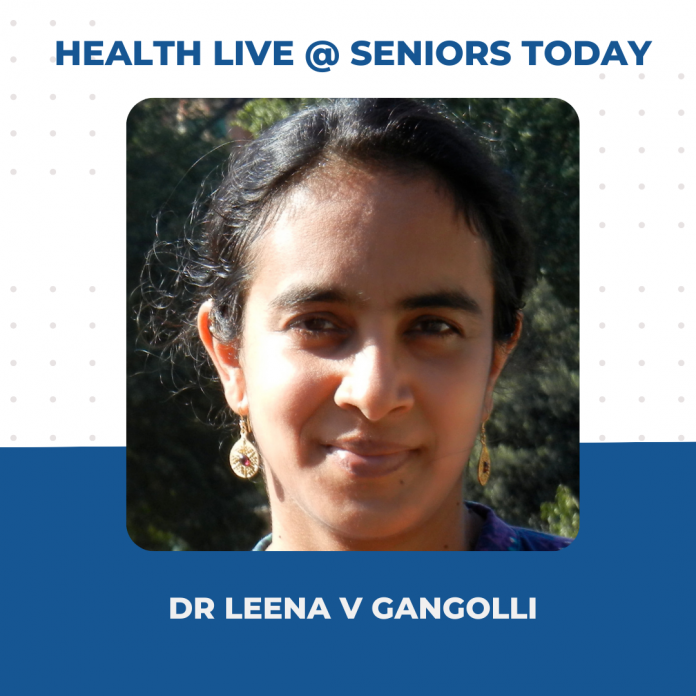On 9th April, 2022, Seniors Today hosted their weekly Health Live webinar. This week we had with us Dr Leena V Gangolli who spoke on and answered questions about Positive Ageing and Geriatric Care.
Dr Leena V Gangolli is a leading Geriatric Palliative Care Physician. She is Senior Medical Officer at Sukoon Nilaya Palliative Care Centre, King George V Memorial, Mumbai.
Dr Gangolli completed her MBBS from the University of Mumbai and then acquired a Master’s Degree in Public Health at the Tata Institute of Social Sciences followed by a Master’s in Public Health from the Harvard School of Public Health, USA. She also pursued a Master’s Degree in Human Rights Law, in which she ranked first at the University of Mumbai, Department of Human Rights. Her dissertation was titled ‘Establishing Palliative Care as a Human Right in India’. She has been working with community-based organisations and NGOs, like CEHAT, in the field of health and human rights, particularly the rights of women, children and the elderly. She is an author and editor of the book “Review of Healthcare in India”, and other publications related to health and human rights in India.
She has served as a Member on the Ethics Committee of the Tata Memorial Hospital and currently serves as a Member and Chairperson of the Ethics Committee at KEM Hospital, and is associated with Silver Innings, an NGO that works with patients and families affected by Dementia and Alzheimer’s. She is a Member of the National Task Force for Palliative Care, appointed by the Ministry of Health and Family Welfare, Government of India and the Maharashtra State Technical Advisory Committee for Palliative and Geriatric Care.
Positive ageing means a holistic approach to ageing. Communities around the world have better access to healthcare, better medicines and thanks to all the advancements, we are living longer and have a “greying society” which means that we have more elderly people in the society.
If we have a holistic approach to ageing, we can optimise our health and have healthier and happier lives as we age.
To have a holistic approach to ageing, we need to follow the acronym PIECES which stands for
Physical domain: we need to understand that ageing comes with certain natural and physiological changes which to some extent are modifiable with exercise, diet and lifestyle modifications but are also parts of the physiological process of ageing.
We need to focus on getting regular eye and dental checkups so as to prevent the risk of accidents and falls.
Nutrition is very important. You need to make sure that you have a healthy mix of fibres, proteins, roughage, etc. Try to avoid processed sugars in your diet.
Exercise needs to be more than just a hobby. You need to have at least 30 minutes of exercise. Good sleep. Reduce your screen time and replace it with green time (walk in the garden, or look at the park, etc.)
Intellectual domain: stay intellectually engaged. A great way to exercise your brain is by learning a new language, if possible. Read a book or the newspaper. Try speaking and learning a new language.
Emotional aspect: late onset or geriatric depression can set in. Emotional health needs to be focused on. Look for signs like loss of sleep or appetite, loss of interest in activities, anxiety, etc no seek the help of a medical professional.
Capabilities: we need to optimise as far as possible on things we can do and compromise on things we cannot do and find ways around it.
Taking up new capabilities and hobbies and activities.
Enhance linguistic capabilities.
Environmental component: a part of healthy living includes ensuring that the environment that we live in is safe.
The first thing we need to do is to reduce falls. This can be done by fitting the bathrooms with grab rails and handrails.
Non slip mats to avoid slipping.
You might also want to identify a safe person in your community or building and hand them a pair of your keys, so that in case of an emergency they can let themselves in.
Social and spiritual networks: social networks are very very important. Loneliness is becoming the newest social epidemic. People who are alone at home are at a higher risk of malnutrition, falls, improper diet, and exclusion from society.
Continue your spiritual practices as you have.
Even a 40 year old, if they have a good diet, health and exercise regime in their lifestyle they are delaying and keeping the comorbidities and neurological deficits at bay. The sooner you inculcate these habits, the better it will be for you.
You can contact Dr Gangoli at lgangolli@gmail.com








